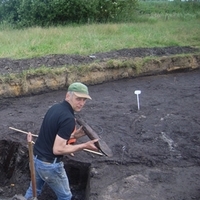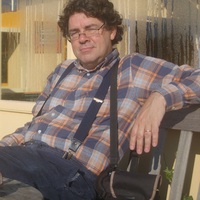
Monique Eerden
Address: Netherlands
less
Related Authors
Bert Groenewoudt
Cultural Heritage Agency of the Netherlands
Hans Renes
Utrecht University
Kees Ribbens
Netherlands Institute for War Documentation
Esther Captain
KITLV
Marc Kocken
Radboud University Nijmegen
Arnoud-Jan Bijsterveld
Tilburg University
Peter Jan Margry
Royal Netherlands Academy of Arts and Sciences









Uploads
Papers by Monique Eerden
The goal of Valletta Harvest is to synthesise the results of development-led archaeological research to produce new knowledge about the history of the Netherlands. These new insights will allow more accurate archaeological predictions to be made, on which archaeology policy can be based. Apart from providing new knowledge of the past, such syntheses also provide input for new questions in the archaeological research agenda.
We examined which areas, themes and archaeological periods were the subject of the most reports. We then selected questions from the national archaeological research agenda that could potentially be answered on the basis of those reports. These are referred to as ‘knowledge opportunities’. Two methods, described here, were used to define these knowledge opportunities (bottom-up and top-down. Finally, we took provisional stock on the basis of the results of the first synthesising research reports and discussions with fellow archaeologists, assessing what we have learnt so far about the scientific synthesis of development-led research reports, and defining recommendations to improve excavation practice and reporting.
Keywords: synthesising research, development-led archaeology, archaeological heritage management, knowledge opportunities, Valletta Convention
De nieuwe nationale onderzoeksagenda archeologie (NOaA 2.0) is vanaf 31 maart 2016 on line. Het is een gebruiksvriendelijk, digitaal informatiesysteem dat de oude NOaA vervangt. In deze notitie wordt uitgelegd waarom en hoe de NOaA 2.0 tot stand is gekomen.
De NOaA 2.0 een hulpmiddel voor selectie en inspiratiebron voor wetenschappelijk relevant archeologisch veldwerk. De nieuwe NOaA beperkt zich tot bovenregionaal belangrijke vragen over het ‘bodemarchief’ van Nederland. De nationale onderzoeksagenda archeologie is vernieuwd om overheden en archeologen beter van dienst te zijn bij het maken van keuzes op het gebied van de archeologie. De NOaA2.0 is bedoeld als aangrijpingspunt voor het maken van eigen keuzes, en het formuleren van eigen beleid. Nieuw zijn handreikingen om onderzoeksvragen te vertalen naar de opgravingspraktijk.
Books by Monique Eerden
- 2017b: R.C.G.M. Lauwerier, M.C. Eerden, B.J. Groenewoudt, M.A. Lascaris, E. Rensink, B.I. Smit, B.P. Speleers & J. van Doesburg (eds.) 2017: Knowledge for informed choices. Tools for more effective and efficient selection of valuable archaeology in the Netherlands, Amersfoort (Nederlandse Archeologische Rapporten 55).
The goal of Valletta Harvest is to synthesise the results of development-led archaeological research to produce new knowledge about the history of the Netherlands. These new insights will allow more accurate archaeological predictions to be made, on which archaeology policy can be based. Apart from providing new knowledge of the past, such syntheses also provide input for new questions in the archaeological research agenda.
We examined which areas, themes and archaeological periods were the subject of the most reports. We then selected questions from the national archaeological research agenda that could potentially be answered on the basis of those reports. These are referred to as ‘knowledge opportunities’. Two methods, described here, were used to define these knowledge opportunities (bottom-up and top-down. Finally, we took provisional stock on the basis of the results of the first synthesising research reports and discussions with fellow archaeologists, assessing what we have learnt so far about the scientific synthesis of development-led research reports, and defining recommendations to improve excavation practice and reporting.
Keywords: synthesising research, development-led archaeology, archaeological heritage management, knowledge opportunities, Valletta Convention
De nieuwe nationale onderzoeksagenda archeologie (NOaA 2.0) is vanaf 31 maart 2016 on line. Het is een gebruiksvriendelijk, digitaal informatiesysteem dat de oude NOaA vervangt. In deze notitie wordt uitgelegd waarom en hoe de NOaA 2.0 tot stand is gekomen.
De NOaA 2.0 een hulpmiddel voor selectie en inspiratiebron voor wetenschappelijk relevant archeologisch veldwerk. De nieuwe NOaA beperkt zich tot bovenregionaal belangrijke vragen over het ‘bodemarchief’ van Nederland. De nationale onderzoeksagenda archeologie is vernieuwd om overheden en archeologen beter van dienst te zijn bij het maken van keuzes op het gebied van de archeologie. De NOaA2.0 is bedoeld als aangrijpingspunt voor het maken van eigen keuzes, en het formuleren van eigen beleid. Nieuw zijn handreikingen om onderzoeksvragen te vertalen naar de opgravingspraktijk.
- 2017b: R.C.G.M. Lauwerier, M.C. Eerden, B.J. Groenewoudt, M.A. Lascaris, E. Rensink, B.I. Smit, B.P. Speleers & J. van Doesburg (eds.) 2017: Knowledge for informed choices. Tools for more effective and efficient selection of valuable archaeology in the Netherlands, Amersfoort (Nederlandse Archeologische Rapporten 55).